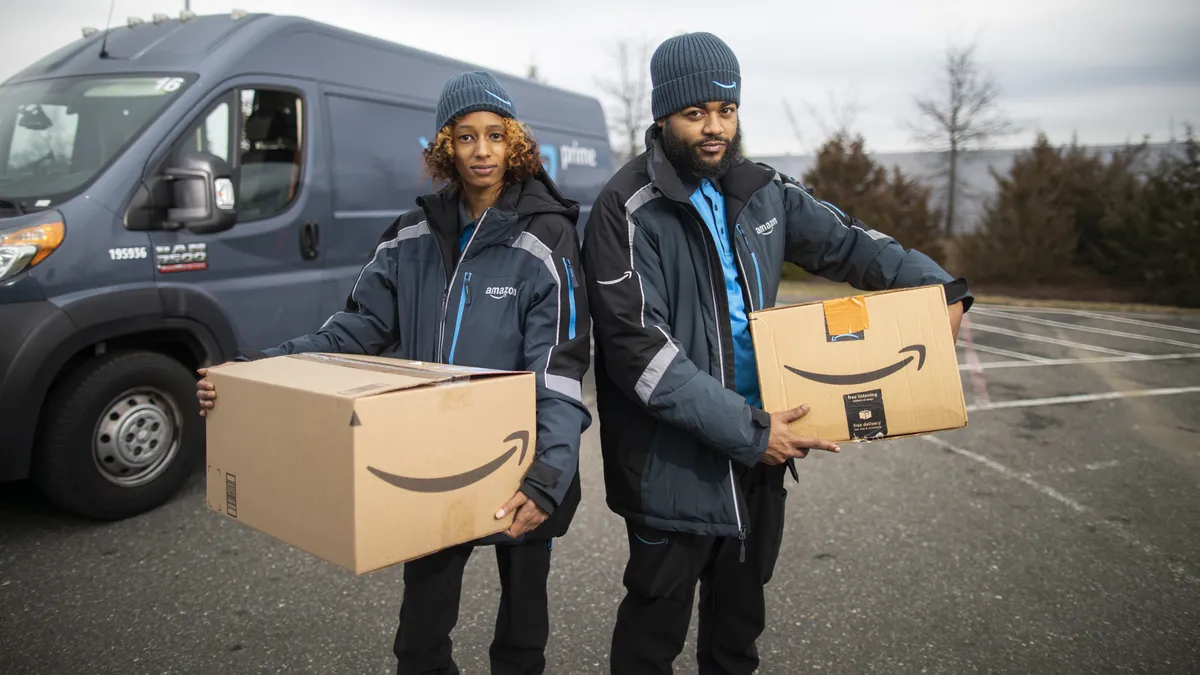The Federal Trade Commission and attorneys general from 17 states on Tuesday sued Amazon in the U.S. District Court for the Western District of Washington, alleging anticompetitive practices that they say hurt consumers and Amazon’s marketplace sellers alike.
“Our complaint lays out how Amazon has used a set of punitive and coercive tactics to unlawfully maintain its monopolies,” FTC Chair Lina Khan said in a statement. “The complaint sets forth detailed allegations noting how Amazon is now exploiting its monopoly power to enrich itself while raising prices and degrading service for the tens of millions of American families who shop on its platform and the hundreds of thousands of businesses that rely on Amazon to reach them.”
In the complaint itself, the FTC declares, “Amazon is a monopolist.”
Amazon tactics the FTC describes as problematic include, “replacing relevant, organic search results with paid advertisements” and prioritizing its own products above items that it knows are superior, according to the FTC’s press release. The agency, whose commissioners voted 3-0 to take the allegations to court, also said that Amazon charges sellers steep fulfillment and other fees that ultimately drive up prices for shoppers and unfairly makes it a “virtual necessity” for sellers to obtain eligibility for its Prime program.
The payments detailed in the press release include a monthly fee sellers pay for each item sold, plus advertising fees that the FTC said together, “force many sellers to pay close to 50% of their total revenues to Amazon. These fees harm not only sellers but also shoppers, who pay increased prices for thousands of products sold on or off Amazon.”
The FTC also took note of what it calls “anti-discounting measures,” including a practice of pushing sellers down in search results if they offer lower prices elsewhere compared to what they advertise on Amazon.
The FTC said in the suit that it “properly excluded” perishable groceries from the online superstore market, in part because those goods require special handling and refrigerated storage facilities that serve a smaller geographic footprint. The agency added that it also excluded brick-and-mortar stores like supermarkets from the online superstore market because the two categories “are not reasonably interchangeable.”
The FTC and the states are seeking a permanent injunction “that would prohibit Amazon from engaging in its unlawful conduct and pry loose Amazon’s monopolistic control to restore competition.” The states involved are Connecticut, Delaware, Maine, Maryland, Massachusetts, Michigan, Minnesota, New Jersey, New Hampshire, New Mexico, Nevada, New York, Oklahoma, Oregon, Pennsylvania, Rhode Island and Wisconsin.
In an emailed statement, David Zapolsky, Amazon general counsel and senior vice president of global public policy, maintained that the company’s moves have actually fostered competition, and accused the FTC’s focus as having “radically departed from its mission of protecting consumers and competition.” He disputed the case “on the facts and the law” and said his team looks forward to making their case in court.
“The practices the FTC is challenging have helped to spur competition and innovation across the retail industry, and have produced greater selection, lower prices and faster delivery speeds for Amazon customers and greater opportunity for the many businesses that sell in Amazon’s store,” he said. “If the FTC gets its way, the result would be fewer products to choose from, higher prices, slower deliveries for consumers and reduced options for small businesses — the opposite of what antitrust law is designed to do.”














